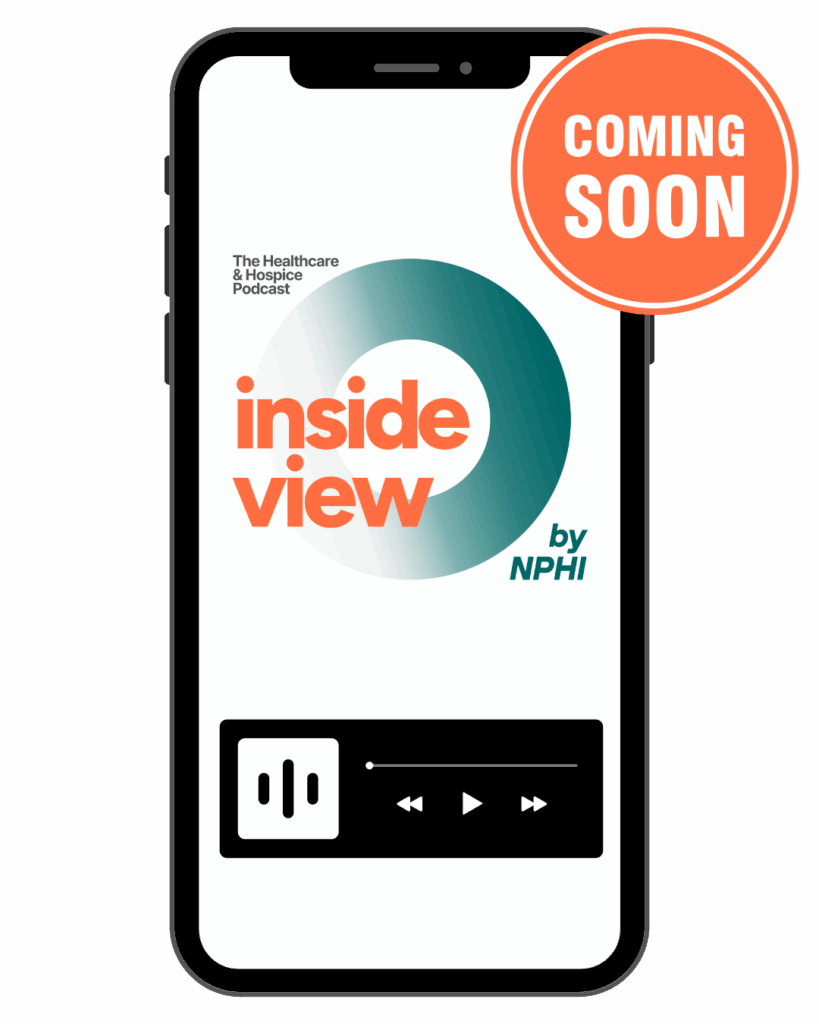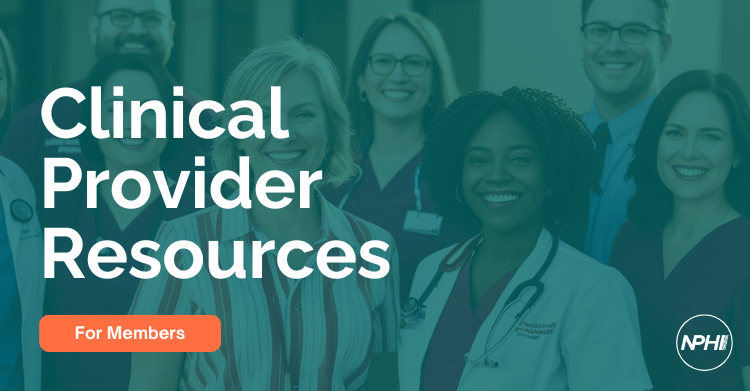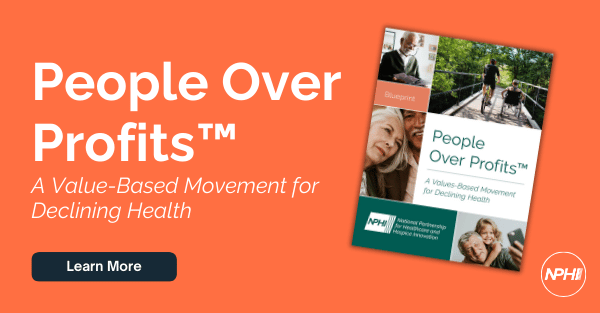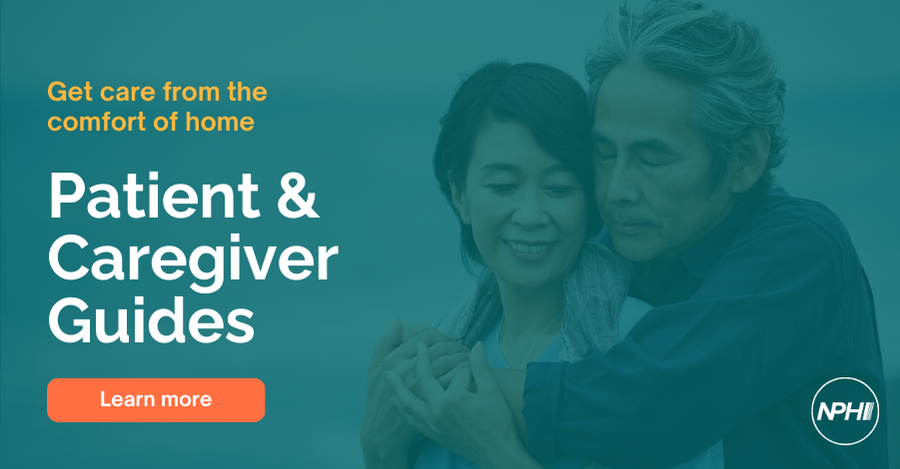Frequently Asked Questions
Finding Care
How can I find a care provider near me?
You can use our Care Provider Locator Tool to find a trusted nonprofit provider in your area. These organizations offer high-quality care that puts people first.
Visit our Care Locator →
You can also call our hotline to find a care provider close by: Call 844-GET-NPHI
What if there is no care provider close by on the care locator?
Not a problem! You can call our toll-free hotline and a member of our team will help you locate a quality nonprofit provider nearby to where you live.
Hospice Care
What is hospice care?
Hospice care is special support for people who are seriously ill and likely in the last six months of life. It helps with pain and symptoms, but also provides emotional and spiritual support for both patients and families. The goal is to make each day as comfortable and meaningful as possible without looking for a cure, and helping people live fully in their final days and months of life.
Is hospice only for people in their final days?
No. This is a common myth. Hospice can begin months before someone passes away. In fact, starting hospice earlier—two to three months before death—often gives families more time to feel supported and prepared and allows the patient to experience more time comfortably at home surrounded by loved ones.
Can hospice care help people live longer?
Yes, it can. Studies have shown that people on hospice often live longer than those who don’t receive this kind of care. Hospice can lower stress, reduce emergency room visits, and improve quality of life—all of which can help someone feel better and even live longer.
Isn't hospice a physical place?
Not at all. Hospice is a type of care, not a place. Most people receive hospice care in their own home or wherever they live—like a nursing home or assisted living. Some areas also have special hospice centers for short-term or intensive needs and to help provide respite for family members.
Is hospice care only for the patient?
No, hospice is for families too. Support is built in for caregivers, children, and anyone close to the patient. Services often include grief support, counseling, respite care, and help with decision-making.
Who pays for hospice care?
Hospice is usually covered by:
Most private insurance plans
If someone doesn’t have insurance or coverage to pay, many nonprofit hospices can help find support or offer care at no cost. Each of our members provide care to everybody who needs it and nobody is turned away if they can’t pay.
Does choosing hospice mean giving up?
Not at all. Choosing hospice means focusing on comfort, peace, and quality of life. It’s a decision about how to live fully with the time left—not about giving up hope.
Is hospice only for people in the hospital?
No. Most hospice care happens at home. People can also receive it in nursing homes or special hospice centers.
Does hospice care stop after a patient dies?
No. Hospice offers grief and bereavement support for families after the patient passes. NPHI member programs offer this support for up to a year.
Palliative & Advanced Illness Care
What is palliative care?
Palliative care is for anyone living with a serious illness—like cancer, heart disease, or dementia. It focuses on relieving pain, managing symptoms, and offering emotional support. You can get palliative care while still getting treatment to try to cure your illness.
When should someone start palliative care?
Anytime after a serious illness is diagnosed. You don’t have to wait until the illness gets worse. Starting early can help improve comfort and quality of life.
How are hospice, palliative, and advanced illness care related?
All three are part of advanced illness care:
Palliative care can start at any time during an illness.
Hospice begins when curative treatments are no longer working or wanted.
Advanced illness care includes both and focuses on supporting people through all stages of a serious illness.
Additional Care & Support
What types of support does hospice offer beyond medical care?
Nonprofit hospices offer many extra services to help the whole person and their family, such as:
Grief Support: Counseling for loved ones after someone dies.
Respite Care: Short breaks for caregivers so they can rest and recharge.
Veteran Support Programs: Care tailored for veterans and their families.
Pet Therapy: Visits from trained therapy animals for comfort and connection.
Spiritual Support: Chaplains or counselors for emotional and spiritual care.
Art & Music Therapy: Creative ways to express feelings and heal.
Nutrition Help: Advice on eating well for strength and comfort.
Learn more at Types of Care →
What is Primary Care at Home?
Primary care at home means doctors, nurses, and other healthcare workers come to your home instead of you going to a clinic. It’s helpful for people who have trouble leaving the house due to age, illness, or disability.
What is PACE?
PACE stands for Program of All-Inclusive Care for the Elderly. It helps older adults live at home instead of moving into a nursing home. PACE provides medical care, home support, meals, transportation, and social activities—all in one plan. It’s for people 55 or older who qualify for nursing home care but want to stay in their community.
About NPHI
What is NPHI?
The National Partnership for Healthcare and Hospice Innovation (NPHI) is a group of nonprofit, community-based advanced illness, hospice, and palliative care providers. Our members are committed to putting patients and families first and delivering the highest quality care.
Learn more at About Us →
What does NPHI do for its members?
NPHI supports members with:
Policy and advocacy work in Washington, DC
Education and training
Communications and advocacy tools
National partnerships
Research and innovation
Quality improvement tools
Plus much more!
Where is NPHI based?
NPHI is headquartered in Washington, D.C., where we advocate for policies in our nations capital that support compassionate, community-based care.
When was NPHI formed?
With roots dating back to the 1990’s as a national work group, NPHI officially came into existence as a national membership organization in 2015.
How can I become a member?
We’d love to hear from you! To learn about joining, visit our Membership Page →
How can I find an NPHI member near me?
Use our easy Care Locator → to search by location.







